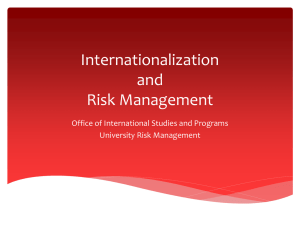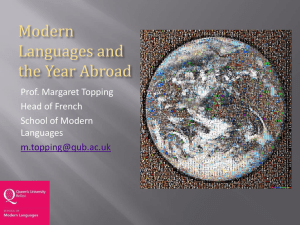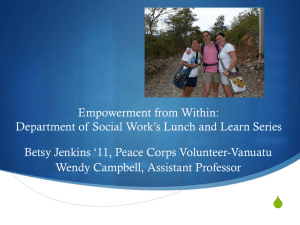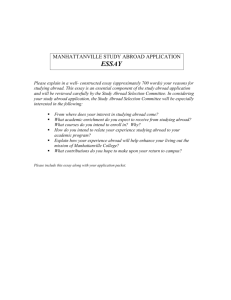Smith Research process
advertisement
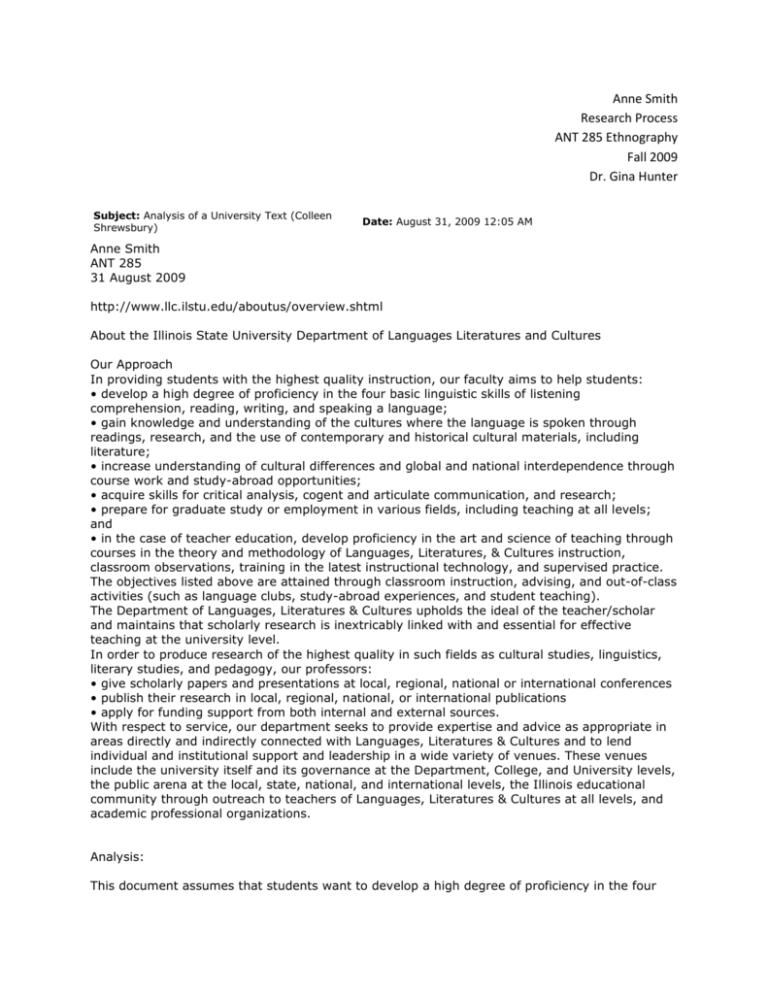
Anne Smith Research Process ANT 285 Ethnography Fall 2009 Dr. Gina Hunter Subject: Analysis of a University Text (Colleen Shrewsbury) Date: August 31, 2009 12:05 AM Anne Smith ANT 285 31 August 2009 http://www.llc.ilstu.edu/aboutus/overview.shtml About the Illinois State University Department of Languages Literatures and Cultures Our Approach In providing students with the highest quality instruction, our faculty aims to help students: • develop a high degree of proficiency in the four basic linguistic skills of listening comprehension, reading, writing, and speaking a language; • gain knowledge and understanding of the cultures where the language is spoken through readings, research, and the use of contemporary and historical cultural materials, including literature; • increase understanding of cultural differences and global and national interdependence through course work and study-abroad opportunities; • acquire skills for critical analysis, cogent and articulate communication, and research; • prepare for graduate study or employment in various fields, including teaching at all levels; and • in the case of teacher education, develop proficiency in the art and science of teaching through courses in the theory and methodology of Languages, Literatures, & Cultures instruction, classroom observations, training in the latest instructional technology, and supervised practice. The objectives listed above are attained through classroom instruction, advising, and out-of-class activities (such as language clubs, study-abroad experiences, and student teaching). The Department of Languages, Literatures & Cultures upholds the ideal of the teacher/scholar and maintains that scholarly research is inextricably linked with and essential for effective teaching at the university level. In order to produce research of the highest quality in such fields as cultural studies, linguistics, literary studies, and pedagogy, our professors: • give scholarly papers and presentations at local, regional, national or international conferences • publish their research in local, regional, national, or international publications • apply for funding support from both internal and external sources. With respect to service, our department seeks to provide expertise and advice as appropriate in areas directly and indirectly connected with Languages, Literatures & Cultures and to lend individual and institutional support and leadership in a wide variety of venues. These venues include the university itself and its governance at the Department, College, and University levels, the public arena at the local, state, national, and international levels, the Illinois educational community through outreach to teachers of Languages, Literatures & Cultures at all levels, and academic professional organizations. Analysis: This document assumes that students want to develop a high degree of proficiency in the four basic linguistic skills of listening comprehension, reading, writing, and speaking a language, and that it is desirable. It assumes that students will gain knowledge and understanding of the languages and cultures taught that they will increase understanding of cultural differences and global and national interdependence. In stating that such knowledge will be gained, it is assumed that students in this department did not already know such things. It is an assumption that this knowledge did not already exist. There is an assumption that expertise and advice in areas directly and indirectly related to languages, literatures, and cultures is desirable in addition to individual and institutional support and leadership. There is an assumption that students don’t already possess the skills for critical analysis; cogent and articulate communication, and research. It is assumed that students want to prepare for graduate study or teaching. The quantity of information provided gives a broad overview of the department and its expectations and goals. It provides enough information that a prospective student could gauge whether they want to pursue a degree in languages, literatures, and cultures. None of the information is fabricated, nor is it irrelevant or unclear. Subject: Discussion 2 Colleen Shrewsbury Date: September 10, 2009 12:15 AM Colleen Shrewsbury ANT 285 9 September 2009 Discussion 2 : Research Question In the broader sense, our topic is simply “study abroad”. To go deeper into it, we want to know specifically why students choose to study abroad or why international students choose to come here to the United States. The half that will be discussing American students studying abroad would like to know what motivates a student to want to go abroad. What kind of things do they expect to see, learn, and experience while there? What country do they choose and why? These questions all relate to the initial decision to study abroad. Follow up questions include : • What did you learn while you were abroad? • Have you changed any of your previous points of views or opinions because of your semester or year abroad? • How do you feel about students coming to the States to study after having been abroad? The reason why I have chosen this particular topic to discuss is because I have a great interest in foreign languages and cultures. I am a double major in Spanish and French, and I think it is very interesting to see the way people other than Americans go about living their lives. I want to know what attracts them here to the United States and what they think of American students studying abroad in their home countries. I presume that I will find a vast array of responses to questions in regards to reasons for going abroad, things learned, and what the people of those countries think about American students coming to their countries to study. Some might say that they want to learn better a language they are studying. Others might say they just want the experience of a lifetime, and others might say that they just want to learn about other cultures outside their own. Some might say that they really enjoyed it and learned a lot, while others might have absolutely hated the experience. I plan on asking a few people that I know that have studied abroad their reasons for going abroad and ask them to describe their experience. My roommate will be my number one source. She just got back after having spent a year studying in Spain. I have another friend who just left to study in France for the semester and will be in Spain the second semester. I also have a friend who is studying here in the States from France. Subject: Discussion 3 Colleen Shrewsbury Colleen Shrewsbury ANT 285 Date: September 10, 2009 1:15 AM 9 September 2009 Discussion 3: Previous Student Research http://www.ideals.uiuc.edu/bitstream/handle/2142/13195/Research%20Process.pdf?sequence= 2 This student’s research relates very closely to the project my group plans on doing. The questions provided by this particular project give a more detailed approach to the same thing we were already going to do. It gives a new perspective on the same issue I never thought of before. For example, this student asks the question “Has study abroad facilitated an international or intercultural dimension in your work as a student or an employee?” I would not have thought to ask how study abroad affects a person in the workplace. Another question asked was whether the amount of money invested to go abroad was worth it. I would not have thought to ask about the financial aspect of it, but that is a very good question. On some level it is a way to “rate your experience.” The information and results provided in this study will give me a way to dig deeper into the subject matter and to help me formulate other more detailed questions. This student chose to talk specifically about the cultural aspect of studying abroad but also asks whether it gave the student a better understanding and deeper appreciation for the United States. It focuses specifically on students from the U.S. who go abroad which is half of my subject matter. Subject: Journal 5 Revised Research Question/Research Plan Date: September 17, 2009 10:52 PM Colleen Shrewsbury ANT 285 17 September 2009 Journal 5 Research Plan/Revise Question Our original question to ask participants is “Why did you decide to study abroad?” It is a very broad question so it may change as we go along or it might just evolve into something more specific. As we ask questions to people, the question may evolve and we will get ideas for other questions as we go along in the process. Problems we might run into include not being able to actually participate in hands on activities for research such as meetings. Subject: Journal # 6 An Interview Date: September 21, 2009 1:10 PM Colleen Shrewsbury ANT 285 21 September 2009 Journal # 6: An Interview I chose to interview my roommate who studied abroad last year in Spain for the whole year. I asked her about her experience and why she chose to study abroad. I think the answers to questions 7, 8, and 9 are quite interesting. They all relate to her expectations of studying abroad and the possibility of not liking it and wanting to come home. I thought it was interesting because most people want to stay where they are when they go abroad and don’t want to come home. Her answers did not reflect any desire to leave Spain and come home, but they got me thinking about things such as “What if I get there, and want to go home?” “How would I go about cancelling everything to come home?” “Would I be able to register for classes back home or would I have to take a semester off?” As I was going through and asking my roommate questions, I started to think about things in relation to the topic at hand that I hadn’t thought of before. It took the interview into a whole new direction I wasn’t expecting. I felt that her answers could have been a little more detailed, but she said she would try to think more in depth about them and give me better answers soon. Although she did not personally want to go home, I realized that it was a possibility for any other student abroad to want to do so. The whole interview in general discusses her expectations and desires and reasons for going abroad, but the few questions mentioned were what caught my attention. 1. Why did you choose to study abroad? a. I always wanted so since I was 14 and because I am going to be a language teacher so it’s required. 2. Why have you always wanted to go abroad? a. I’ve always wanted to become fluent in Spanish and know what it’s like to live somewhere where you’re not completely familiar. Something you’re not completely used to. 3. What were your expectations of your trip abroad before you got there? a. I thought it was going to be a little bit intimidating in a foreign place you’ve never been to and a culture that you don’t know. I thought once I got settled it would be a great experience and I would get to meet a lot of people. 4. What did you expect to get from your experience abroad? a. I expected to become confident in my Spanish skills, meet a lot of friends, and become more cultured. 5. Did you get out of it what you thought you would? a. Yes 6. Did you get anything out of it that you weren’t expecting? a. No, I pretty much got what I expected. 7. Was it like you expected once you got there? a. NO. The people were not friendly, and it was just completely different. The city structure and the way restaurants and stores were was totally different than anything I expected to find. 8. Was it hard to adjust? a. It took about three or four weeks before I got settled in, and got used to the way things were and the way people were, what it was like to live a Spanish lifestyle. Adjusting to siesta was difficult. In Spain everything shuts down between two and five. That’s when you have the big meal with your family. 9. Was there any point when you wished you could go home? a. Sometimes during holidays. I was only really homesick for the first few weeks until I got adjusted. After that I was never really homesick. 10. If you could give advice to someone contemplating going abroad, what would you tell them? a. It’s the best experience you’ll have. It is worth all the money spent because you get so much out of it in return. It not only opens your eyes to a new culture and a new way of living, but you learn a lot about yourself. It can be very beneficial to anyone who is planning on teaching a foreign language. Subject: Journal 8 Revised research plan/question Date: October 2, 2009 7:46 PM Colleen Shrewsbury ANT 285 2 October 2009 Journal 8 : Revised research plan/question The original question our group intended to pose to students who have studied abroad was “Why did you choose to study abroad?” I did a more extensive interview of my roommate who studied in Spain last year, and as I was interviewing her, I thought of more questions to ask her that were more detailed than what I thought of the first time I interviewed her asking the same question. The only real difference between the question I originally asked and the one I asked this time is the wording of it. It is a little more specific this time. I asked her what her major inspiration was to study abroad. Our plan of research continues to remain the same. I did a face to face interview with my roommate, and I have a friend who is abroad at the moment. We need to obtain permission to do an interview via email. I would like to find someone who is in the process of planning to go abroad so that we can have all three points of view on the subject, planning to go abroad, abroad presently, and has been abroad. Subject: Journal 4: An Observation Date: October 4, 2009 12:21 AM Colleen Shrewsbury ANT 285 3 October 2009 Journal 4 : An Observation Unfortunately for my research topic, ISU students who study abroad, there is not anything that can be observed. The only thing that could be observed is a meeting between a student and a professor or advisor in the study abroad office to discuss a student’s plans to go abroad? However, within these discussions there is often talk of financial issues which are private and cannot be revealed to anyone but the student studying abroad and the professor they are speaking to. 1. If it were possible for me to observe such a meeting, I would expect to hear students talking about where and when they want to go. They would talk about why they want to go and what they will be studying once they get there. I would hear professors advising students about what they need to do to make it all happen such as getting passports and transcripts in order. A student may also be discussing how long they would like to stay abroad. 2. A meeting like this would probably take place any time between 9 a.m. and 5 p.m. in a professor’s office. Subject: Journal 9: Interview Date: October 4, 2009 12:45 AM Colleen Shrewsbury ANT 285 3 October 2009 Journal 7 : Data i. How long did it take you to adjust to life in another country? 1. It took about a month to adjust and start feeling comfortable and learn how people go about their daily lives. To really feel like you fit in it takes a long time, months, to feel like you know what is going on and where to go for certain things and to feel like you’ve assimilated into the culture. ii. Do you miss the people that you met there or want to go back? 1. Yes. I met friends from all over. I miss my friends from Spain, and would love to visit them. I also made friends from all over the world. We were all united together in one country for the year, and then when it was over we all went home to our “real lives” in our respective countries. It’s like the friendship was just over because we couldn’t all be together. These are two excerpts from the second, more extensive interview I did of my roommate who studied in Spain last year. She was an exceptional case because she went for the entire year, whereas most students only spend one semester abroad. When she told me how long it took her to adjust to life in another country I was surprised. I was expecting to hear her say that maybe it took her about a month or so before she was comfortable. She said it took several months which is basically the duration of the majority of students’ stay abroad. By the time a student gets used to being where they are, it’s time to go home. I think it would be more enjoyable to be in another country if you were really familiar with the people, places and customs and daily routines. I suppose her trip may have been more enjoyable the second half of the year because by then she was pretty much used to the way things are done. The second excerpt was an eye opener. It is inevitable that if you study abroad you will make friends there who will be your best friends and whom you will remember for the rest of your life. However, my roommate said that she will more than likely never see these people again in her life, these people who were her whole life for an entire year. Being abroad was like living in a fantasy, so the friendships formed were, in a way, fantasy friendships. They were not imaginary, but temporary. I just thought it was sad that a person would meet someone and become such good friends with them and then have to say goodbye. Subject: Scholarly Article Summaries Date: October 15, 2009 9:42 PM Colleen Shrewsbury ANT 285 Article Summaries The Impact of an International Health Study Abroad Program on University Students from the United States Reginald Fennell The main focus of this article is on students who are pre-medicine who have gone abroad to study medicine in an international context. They studied the different health care systems in place in countries other than the United States. In spite of the fact that this article was mostly about medical students who studied abroad, the basic facts still remain. They gained many of the same things that any other student who studies or has studied abroad would gain. They learned that there is so much more out there besides what is in the United States and that we have been truly sheltered here. They learned to understand and accept other cultures and the way they think and act. The purpose of this study on medical students who studied abroad was to assess the impact of a study abroad program on students and the impact on the career goals of students who completed the program. Some students said they became aware of how other countries differ in outlook and values. They said that the study abroad program allowed them to become a more open – minded and internationally educated professional. Fennell, Reginald. "The impact of an international health study abroad program on university students from the United States." Global Health Promotion 16.17 (2009): 17-23. Print. Student Intercultural Proficiency from Study Abroad Programs Irvine Clarke, III, Theresa B. Flaherty, Newell D. Wright, Robert M. McMillen This was mostly an informative article about the basic advantages and factors of a study abroad program, SAP. Most of the benefits mentioned in this article included greater intercultural proficiency, increased openness to cultural diversity, and they became more globally minded than students who stayed in the traditional campus setting and did not study abroad. It is becoming increasingly important, especially for people in the marketing field, to have studied abroad and to have a global awareness to be able to appeal to an increasingly culturally diverse market. Research says that time spent abroad may facilitate personal growth, change world views, and could enhance student résumés. Students gain intercultural proficiency, global mindedness, intercultural communication, openness to diversity, and intercultural sensitivity. Clarke, III, Irvine, Theresa B. Flaherty, Newell D. Wright, and Robert M. McMillen. "Student Intercultural Proficiency From Study Abroad Programs." Journal of Marketing Education 31.173 (2009): 173-79. Print. Subject: 15 - outline Date: November 9, 2009 12:47 AM I. Intro A. Abstract B. The reason why we are interested in our topic II. Overview of program A. Brief history of the study abroad program B. Stats C. Process as seen by the university D. Expectations of the university a. Teacher interviews III. Students Take A. Student planning to go abroad interviews B. Students who have been abroad interviews C. Possibly interviews who are currently studying abroad interviews IV. Conclusion




